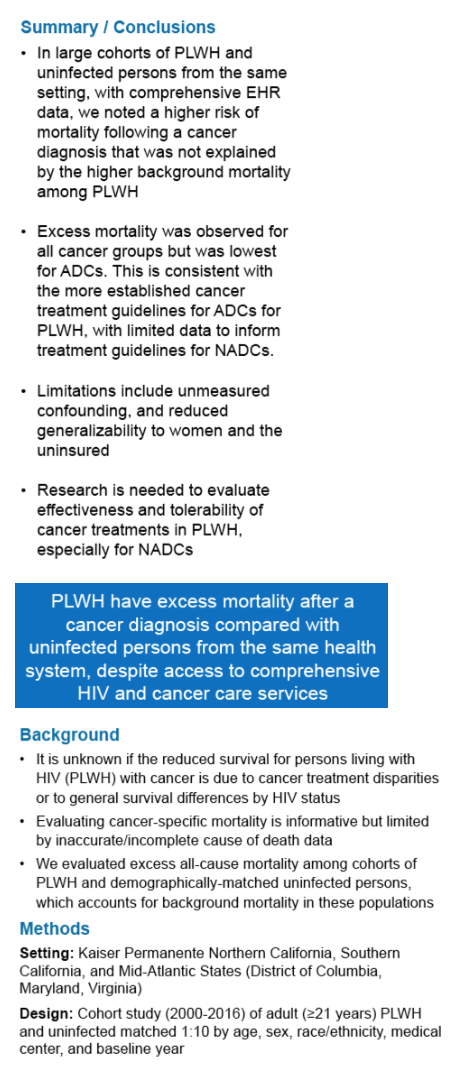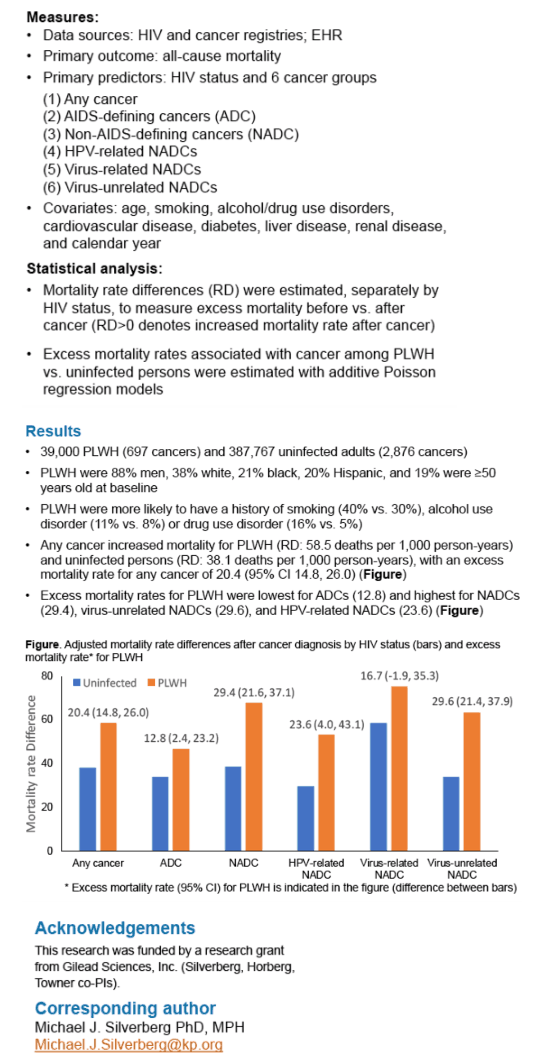 |
 |
 |
| |
Much Higher Death Rate After Cancer Diagnosis in People With HIV
|
| |
| |
CROI 2020, March 8-11, 2020, Boston
Mark Mascolini
Compared with HIV-negative cancer patients cared for in the same healthcare system, after a cancer diagnosis people with HIV had a higher all-cause death rate by 20 deaths per 1000 person-years [1]. Higher background mortality did not explain the higher postdiagnosis mortality in the HIV group.
Researchers from the Kaiser Permanente healthcare system explained that contributors to a higher death rate in cancer patients with than without HIV remain incompletely understood. Disparities in treatment of the two group could explain the higher death rate with HIV, but so could lower overall survival in people with HIV.
To address these issues, the Kaiser team evaluated excess all-cause mortality in healthcare system members with HIV and a demographically matched group of system members without HIV. They analyzed data from Kaiser Permanente patients in California, Maryland, Virginia, and Washington, DC. The study included people 21 years old or older enrolled in the system in 2000-2016. Researchers matched each HIV-positive person to 10 HIV-negative people by age, sex, race/ethnicity, medical center, and baseline year.
The study aimed to identify differences in all-cause mortality in 6 cancer groups: any cancer, AIDS-defining cancers (ADCs), non-AIDS-defining cancers (NADCs), human papillomavirus (HPV)-related NADCs, other virus-related NADCs, and virus-unrelated NADCs. Statistical analysis considered the impact of age, smoking, alcohol or drug use disorders, cardiovascular disease, diabetes, liver disease, kidney disease, and calendar year.
The 39,000 HIV-positive people had 697 cancers, while the 387,767 HIV-negative people had 2876 cancers. Among people with HIV, 88% were men, 38% white, 21% black, 20% Hispanic, and 19% 50 years or older.
Getting diagnosed with any cancer boosted all-cause mortality by 58.5 deaths per 1000 person-years in people with HIV and by 38.1 deaths per 1000 person-years in the HIV-negative group. That meant people with HIV had an excess mortality of 20.4 deaths per 1000 person-years for any cancer compared with demographically similar HIV-negative people.
Excess mortality with HIV proved greatest for virus-unrelated NADCs (29.6 per 1000 person-years) and successively lower for all NADCs (29.4 per 1000), HPV-related NADCs (23.6 per 1000), other virus-related NADCs (16.7 per 1000), and ADCs (12.8 per 1000).
The researchers surmised that the lower excess mortality for AIDS-defining cancers reflects more established cancer treatment guidelines for these cancers in people with HIV compared with "limited data to inform treatment guidelines for non-AIDS-defining cancers." They noted that the excess all-cause mortality in the HIV group could not be explained by the higher overall death rate with HIV because the researchers matched the HIV group and non-HIV group and included major death risk factors in their statistical analysis. The Kaiser team called for more research to evaluate cancer treatment effectiveness and tolerability in people with HIV, especially for non-AIDS cancers.
Reference
1. Silverberg MJ, Sarovar V, Satre DD, et al. Excess mortality after cancer diagnosis in persons with HIV. Conference on Retroviruses and Opportunistic Infections (CROI). March 8-11, 2020. Boston. Abstract 870.
-------------------------
Excess mortality after cancer diagnosis in persons living with HIV
Michael J. Silverberg1, Varada Sarovar1, Derek D. Satre1,2, Stacey Alexeeff1, Wendy
Leyden1, Jennifer O. Lam1, Alexandra Anderson1, Rulin C. Hechter3, Haihong Hu4, Julia L. Marcus5, William Towner3, Qing Yuan3, Michael Horberg4
1Division of Research, Kaiser Permanente Northern California, Oakland, CA; 2Department of Psychiatry, University of California, San Francisco, San Francisco, CA; 3Department of Research & Evaluation, Kaiser Permanente Southern California, Pasadena, CA; 4Mid-Atlantic Permanente Research Institute, Kaiser Permanente Mid-Atlantic States, Rockville, MD; 5Harvard Medical School and Harvard Pilgrim Health Care Institute, Boston, MA



|
| |
|
 |
 |
|
|